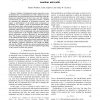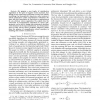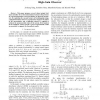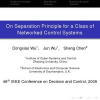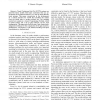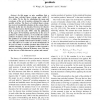109
click to vote
CDC
2009
IEEE
15 years 6 months ago
2009
IEEE
— Multi-agent coordination problems can be cast as distributed optimization tasks. Probability Collectives (PCs) are techniques that deal with such problems in discrete and conti...
100
click to vote
CDC
2009
IEEE
15 years 6 months ago
2009
IEEE
— In order to reduce the computational load of the recursive least squares (RLS) algorithm, a decomposition based least squares algorithm is developed for non-uniformly sampled m...
105
click to vote
CDC
2009
IEEE
15 years 6 months ago
2009
IEEE
— Models of biochemical reaction networks can be decomposed into a stoichiometric part and a kinetic part. The stoichiometric part describes the structural mass flows while the ...
122
click to vote
CDC
2009
IEEE
15 years 6 months ago
2009
IEEE
— We propose a new family of classification algorithms in the spirit of support vector machines, that builds in non-conservative protection to noise and controls overfitting. O...
104
click to vote
CDC
2009
IEEE
15 years 6 months ago
2009
IEEE
Abstract— In this paper we consider several problems involving control with limited actuation and sampling rates. Event-based control has emerged as an attractive approach for ad...
110
click to vote
CDC
2009
IEEE
15 years 6 months ago
2009
IEEE
Abstract— This paper proposes a novel robust output feedback controller for an electromechanical system in the presence of external disturbance and uncertainties of physical para...
119
Voted
CDC
2009
IEEE
15 years 6 months ago
2009
IEEE
Abstract— Q-learning is a technique used to compute an optimal policy for a controlled Markov chain based on observations of the system controlled using a non-optimal policy. It ...
109
click to vote
CDC
2009
IEEE
15 years 6 months ago
2009
IEEE
— Timed Continuous Petri Net (TCPN) systems are piecewise linear models with input constraints that can approximate the dynamical behavior of a class of timed discrete event syst...
120
click to vote
CDC
2009
IEEE
15 years 6 months ago
2009
IEEE
— In this paper we give conditions that a discrete time switched linear systems must satisfy if it is stable. We do this by calculating the mean and covariance of the set of matr...

